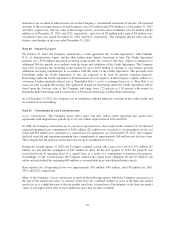Yahoo 2012 Annual Report Download - page 110
Download and view the complete annual report
Please find page 110 of the 2012 Yahoo annual report below. You can navigate through the pages in the report by either clicking on the pages listed below, or by using the keyword search tool below to find specific information within the annual report.The Company does not believe that it is probable that the judgment will be sustained on appeal and, accordingly,
has not recorded an accrual for the judgment.
The Company cannot predict the timing of a decision or assure the ultimate outcome of its appeals. The
Company intends to vigorously pursue all of its appeals. If the current appeals were to be unsuccessful, the
Company and Yahoo! Mexico may file a petition with the Mexican Federal Civil Collegiate Court for the First
Circuit (the “Civil Collegiate Court”) to challenge the decision of the Superior Court as unconstitutional,
unlawful, or both. If filed, this petition also must be heard as a matter of law. The parties may then petition for
review of any decision of the Civil Collegiate Court to the Supreme Court of Justice of the Nation of Mexico (the
“Mexico Supreme Court”). A petition to the Mexico Supreme Court, if filed, is granted at the discretion of the
Mexico Supreme Court and its review is limited to interpretations of the Constitution of Mexico or the
constitutionality of a provision of Mexico law.
The Company has determined, based on current knowledge, that the amount or range of reasonably possible
losses, including reasonably possible losses in excess of amounts already accrued, is not reasonably estimable
with respect to certain matters described above. The Company has also determined, based on current knowledge,
that the aggregate amount or range of losses that are estimable with respect to the Company’s legal proceedings,
including the matters described above other than the Mexico matter, would not have a material adverse effect on
the Company’s consolidated financial position, results of operations or cash flows. Amounts accrued as of
December 31, 2011 and December 31, 2012 were not material. The ultimate outcome of legal proceedings
involves judgments, estimates and inherent uncertainties, and cannot be predicted with certainty. In the event of a
determination adverse to Yahoo!, its subsidiaries, directors, or officers in these matters including in the Mexico
matter, however, the Company may incur substantial monetary liability and/or be required to change its business
practices. Either of these events could have a material adverse effect on the Company’s financial position, results
of operations, or cash flows. The Company may also incur substantial legal fees, which are expensed as incurred,
in defending against these.
Note 12 S
TOCKHOLDERS
’E
QUITY
The Board has the authority to issue up to 10 million shares of preferred stock and to determine the price, rights,
preferences, privileges, and restrictions, including voting rights, of those shares without any further vote or action
by the stockholders.
Stock Repurchases. The Company repurchases its common stock from time to time in part to reduce the dilutive
effects of its stock options, awards, and employee stock purchase plan.
In June 2010, the Board authorized a stock repurchase program allowing the Company to repurchase up to $3
billion of its outstanding shares of common stock from time to time. That repurchase program, which by its
terms, would have expired in June 2013, was exhausted during the third quarter of 2012. In May 2012, the Board
authorized a stock repurchase program allowing the Company to repurchase up to an additional $5 billion of its
outstanding shares of common stock from time to time. The May 2012 repurchase program, according to its
terms, will expire in June 2015 unless revoked earlier by the Board. Repurchases under the repurchase programs
may take place in the open market or in privately negotiated transactions, including derivative transactions, and
may be made under a Rule 10b5-1 plan.
Under the October 2006 program, in the year ended December 31, 2010, 63 million shares were repurchased
under the October 2006 program for a total of $973 million, which exhausted the repurchase under the October
2006 program, and 56 million shares were repurchased under the June 2010 program for a total of $776 million,
resulting in aggregate repurchases during the period of 119 million shares for a total of $1.7 billion at an average
price of $14.68 per share. During the year ended December 31, 2011, 110 million shares were repurchased under
the June 2010 program for a total of $1.6 billion at an average price of $14.75 per share. During the year ended
December 31, 2012, the Company repurchased approximately 126 million shares of its common stock under the
96
























